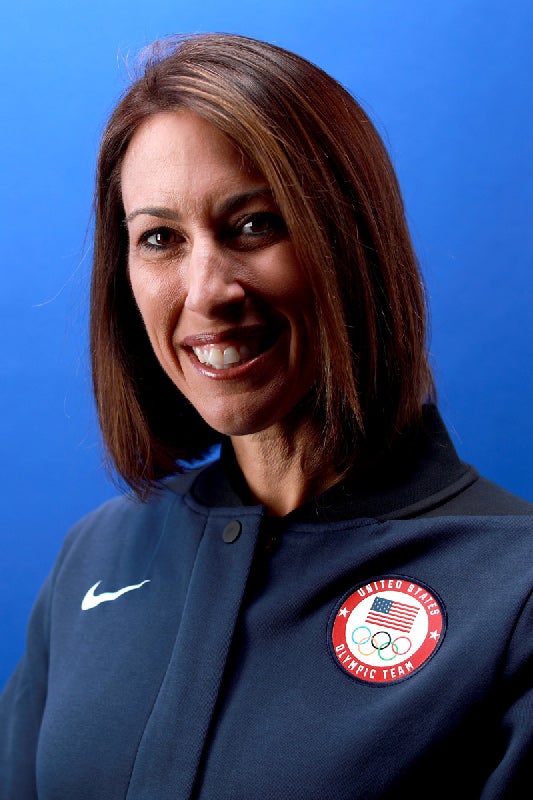Janet Evans Keeps Olympics Spirit Aflame as L.A. Readies for 2028
The four-time gold medalist and Trojan alumna paves the way for a new generation of athletes.
On July 28, 1984, the excitement in Southern California was palpable. More than 92,000 spectators crowded into the Los Angeles Memorial Coliseum to watch the opening ceremony for the Games of the XXIII Olympiad. Millions more at home saw giant balloons released and skywriting planes spell “welcome” overhead. John Williams’ now-iconic “Olympic Fanfare and Theme” played for the first time.
As athletes paraded into the stadium, a 13-year-old swimmer high in the stands watched it all in awe. “I elbowed one of my brothers and said, ‘I’m going to do that one day.’ He was like, ‘Yeah, whatever,’” Janet Evans ’95 remembers with a laugh.
Later, the crowd cheered as decathlon champion Rafer Johnson lit the Olympic cauldron. At that moment, Evans could have also told her brothers, “I’m going to do that, too.”
The swimmer from Fullerton, California, etched her name in the record books for earning a combined four gold medals and a silver at the 1988 and 1992 Olympics, where she dominated in freestyle distance races. She almost quit swimming after 1992 but decided to return for the 1996 Atlanta games. During the lighting ceremony, she was chosen to carry the torch into the stadium and pass the Olympic flame to one of her heroes: Muhammad Ali. That moment when Ali appeared on the stage — often named as one of the most powerful in Olympic history — left a lasting impact on Evans.
“After standing there with that man and watching him, I realized that as Olympians, as Olympic champions, we carry a mantle to inspire and motivate others.”

Janet Evans, USC legend, opens a new chapter
Evans, a USC Annenberg School for Communication and Journalism alumna, has embarked on a busy second act that has included speaking at engagements, appearing on television, writing books and leading swim clinics. She is also chief athlete officer for the 2028 Olympic and Paralympic Games in Los Angeles, a “touchdown to takeoff” role that consults on everything surrounding the athlete experience, from transportation and training to food at the Athletes’ Village.
The Olympic Hall of Fame swimmer admits her transition from competitive sports was easier than most. “I say that in all humility because not every athlete wins four gold medals and receives this attention,” she says. “Ninety percent of athletes at the Olympic and Paralympic Games don’t win medals.”
After the games, Olympic athletes who dedicated their lives to their sport are often left wondering: What next?
Evans hopes to find answers through a mentorship program she’s developing. Meeting with experts across industries, “we discuss opportunities for athletes and how the skill sets they have can contribute to the business world.” She believes the program will be one of the most important legacies of L.A.’s games.
What the Olympics and Paralympics bring to the city are inspiration, optimism and hope.
Janet Evans
USC set to welcome Olympians
“As a Trojan, I’m also very proud of what USC will be offering Olympians,” she adds. The Galen Center will play host to badminton, the Uytengsu Aquatics Center will be a training pool facility and Dedeaux Field will be temporarily transformed into a swimming and diving venue. Media from around the world will stay at USC Village.
Evans has come a long way since that day as an awestruck teenager watching from the stands, but her love of the Olympic Games remains unchanged. “What the Olympics and Paralympics bring to the city are inspiration, optimism and hope,” she says. “They bring people this idea that, hey, if that person can go out there and do something against all odds, why can’t I follow my dreams that seem crazy and out of reach? There’s no greater city to do that in.”



